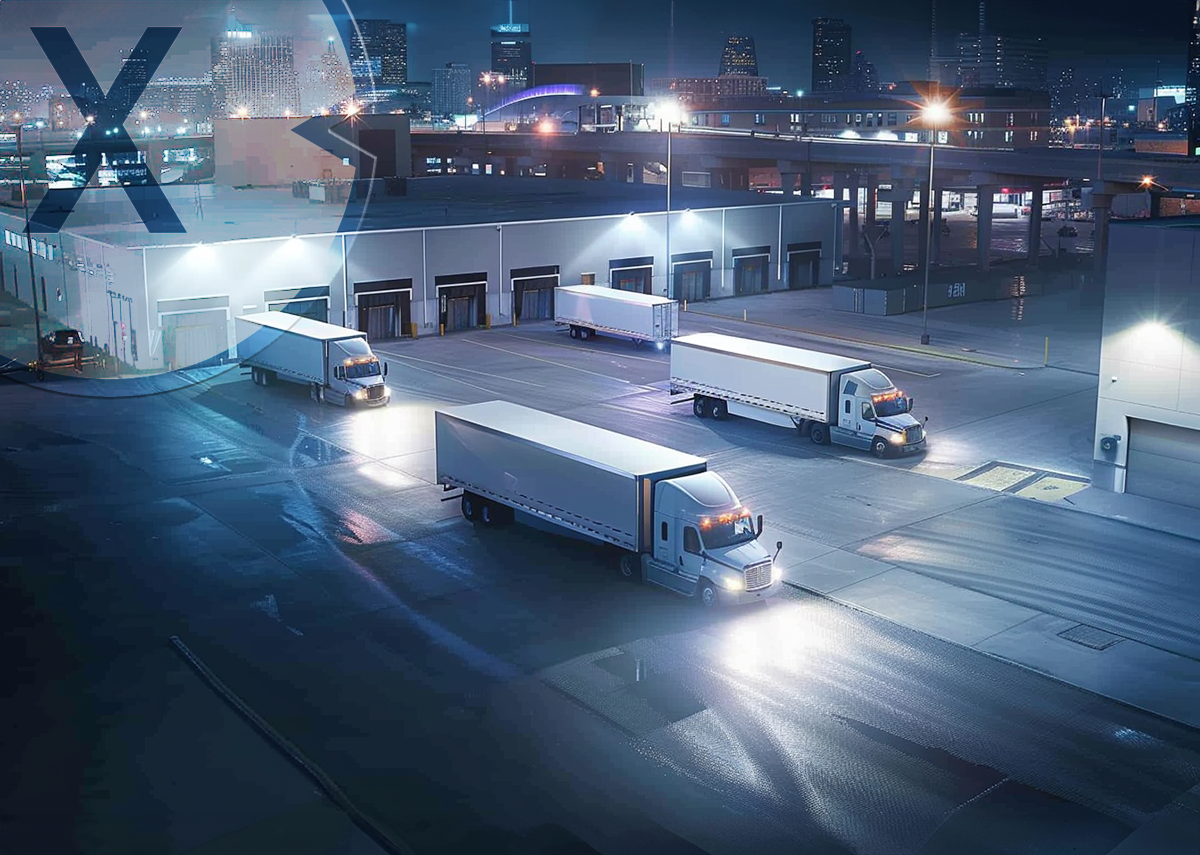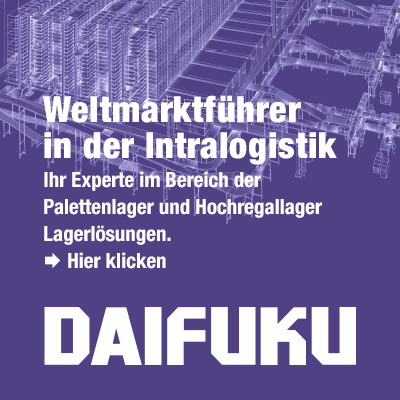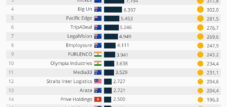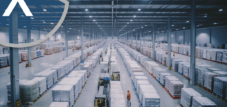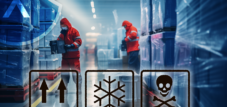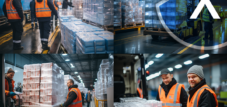Which countries are the largest players in the refrigerated logistics market – in North America, Europe and Asia Pacific?
Language selection 📢
Published on: October 16, 2024 / Update from: October 16, 2024 - Author: Konrad Wolfenstein
📦🌡️ Refrigerated logistics: How the cold chain transports vital goods over long distances
🔍 Which countries are the largest players in the refrigerated logistics market?
Refrigerated logistics, often referred to as cold chain, is an essential part of global supply chains. It ensures the safe transport of temperature-sensitive goods such as food, pharmaceuticals and chemical products over long distances and through various climatic conditions. In an increasingly globalized world, the demand for fresh produce and essential medicines is continually increasing, driving the refrigerated logistics market to grow significantly.
🚀 Leading countries in refrigerated logistics
The largest players in the refrigerated logistics market include the United States, China, India, Germany, the Netherlands, Japan and Brazil. These countries have made significant investments in their cold logistics infrastructure and use state-of-the-art technologies to ensure efficiency and reliability of their cold chains.
🇺🇸 United States
The United States is one of the leaders in the refrigerated logistics industry. Thanks to a highly developed infrastructure and large investments in technology and innovation, the country has taken a leading position. The demand for fresh food and high-quality pharmaceuticals is driving the growth of the market. Companies are increasingly relying on data-driven solutions to monitor and optimize supply chains. By using sensors and real-time data, the temperature and condition of goods can be continuously monitored during transport, ensuring the quality of the products right up to the end consumer.
🇨🇳 China
China is another important market player. With a growing middle class, the demand for fresh, high-quality food is increasing. Chinese companies are investing heavily in expanding cold chain infrastructure to serve domestic consumption and increase exports of fresh products. The rise of e-commerce platforms has reinforced the need to integrate efficient cold chains that meet the demands of the digital age. Artificial intelligence and machine learning are used to forecast demand and manage inventory efficiently.
🌾 India
India is also witnessing rapid growth in the refrigerated logistics sector. The country is striving to reduce food losses and increase agricultural efficiency. Investments in cold chain infrastructure are crucial to improving food supplies and promoting exports of agricultural products. The Indian government is implementing programs to support the development of modern cold storage and transportation systems, which strengthens the national economy and increases food security.
🇩🇪 Germany
Germany is a leader in refrigerated logistics in Europe. With advanced technology and strict quality standards, the country sets standards in the industry. German companies are known for their efficient and reliable logistics solutions. The strong presence of the food and pharmaceutical industries also contributes to the importance of the refrigerated logistics market. Germany is also a pioneer in the implementation of automated warehouse facilities and the use of robotics to optimize processes and minimize human errors.
🌍 Netherlands
The Netherlands, although small in area, is a significant player due to its strategic location and highly developed port infrastructure. As a hub for European trade, they have extensive cold storage capacity and efficient transport systems. Dutch companies specialize in the handling and distribution of fresh produce throughout Europe. Promoting sustainable practices and using renewable energy in refrigerated logistics are other aspects that set the Netherlands apart.
🐟 Japan
Japan attaches great importance to the quality and freshness of food, which places high demands on refrigerated logistics. Technological innovations and automation play an important role in the Japanese cold chain. Demand for fresh seafood and quality foods is driving the market. Japan is investing in advanced cooling systems and environmentally friendly technologies to ensure both efficiency and sustainability.
🍊 Brazil
Brazil, as one of the largest exporters of agricultural products, has significantly expanded its refrigerated logistics infrastructure in recent years. The need to transport perishable goods over long distances has led to investments in cold chains. This allows Brazil to strengthen its position in the global meat, fruit and vegetable markets and promote economic development in the agricultural sector.
⚙️ Factors for leadership position
The factors that contribute to these countries being leaders in refrigerated logistics include well-developed infrastructure, technological advancements, high demand from the food and pharmaceutical industries, and supportive government policies. Investments in research and development make it possible to develop innovative solutions that increase efficiency and minimize losses. Employee training and expertise are also critical to operating complex systems and performing maintenance.
💡 Technological innovations
Technology plays a crucial role in the further development of refrigerated logistics. Modern cooling systems, improved insulation materials and the introduction of temperature monitoring systems have significantly increased the efficiency of the cold chain. In countries such as Germany and Japan, automated warehouse facilities and robotics are used to optimize processes. In the US, companies rely on data-driven solutions and real-time monitoring to ensure product quality and safety.
🌱 Sustainability and environmental awareness
With global efforts to reduce greenhouse gas emissions, companies are looking for environmentally friendly solutions. The use of renewable energy, the development of energy-efficient cooling systems and the reduction of food waste are key goals. Countries like the Netherlands and Germany actively promote sustainable practices and set standards that influence the entire industry. The integration of environmentally friendly technologies not only makes ecological sense, but also improves the brand image and the competitiveness of companies.
Challenges and solutions
Despite the growth, players in refrigerated logistics face various challenges. High investment costs for building and maintaining infrastructure are a significant obstacle. In addition, energy consumption and environmental regulations represent further requirements. Different standards and regulations between countries can complicate international trade. Therefore, international organizations and governments are working to establish harmonized standards to facilitate exchanges.
The industry needs to develop sustainable solutions to reduce the environmental footprint while meeting increasing demand. Innovative approaches such as the use of drones for delivery to remote areas or the development of intelligent packaging that monitors the condition of products show the potential of the industry. The integration of Internet of Things (IoT) and blockchain technologies enables better traceability and transparency along the entire supply chain.
📈 Increasing demand
The refrigerated logistics market will continue to be characterized by technological innovations and increasing demand for fresh and safe products. Advancing urbanization and growing health consciousness among consumers will increase the need for efficient cold chains. The development of smart cities and the integration of logistics systems will offer new opportunities and challenges.
🔧 Technology and innovation
The United States, China, India, Germany, the Netherlands, Japan and Brazil are among the largest players in the refrigerated logistics market. Their investments in infrastructure, technology and innovation enable them to meet increasing demands and ensure global supplies of temperature-sensitive goods. The combination of technological innovation, sustainable practices and strategic planning will be crucial to shaping the future of refrigerated logistics and successfully meeting global challenges.
📣 Similar topics
- 📈 Strengthening refrigerated logistics: 1.6% growth in 2023
- 💵 Refrigerated logistics market reaches 764.2 billion euros: A positive sign!
- 🌍 Global trends in refrigerated logistics: upswing in emerging markets
- 🔍 Technological progress: How IoT improves refrigerated logistics
- 🌱 Sustainability as key: refrigerated logistics and its ecological footprint
- 🏥 COVID-19 and cold logistics: The importance of reliable cold chains
- 🤖 Innovation through AI: The future of refrigerated logistics
- 🛒 Online trading and refrigerated logistics: New challenges for fresh products
- ⚖️ Regulations in refrigerated logistics: requirements and challenges
- 🏙️ Urbanization and refrigerated logistics: The demand for fresh food
#️⃣ Hashtags: #ColdLogistics #Sustainability #Technology #Emerging Countries #OnlineTrading
Xpert partner in warehouse planning and construction
📦 Refrigerated logistics in focus: quality and integrity in the supply chain
🌍 Global market leaders in refrigerated logistics
Market leader in refrigerated logistics
The refrigerated logistics market is a crucial part of the global supply chain, particularly for temperature-sensitive products such as food, pharmaceuticals and chemicals. This industry ensures that such products are stored and transported in optimal conditions to maintain their quality and integrity. In this context, several countries play a leading role in the global refrigerated logistics market.
🌎 North America
North America – Refrigerated Logistics Market
North America, particularly the USA, is a major player in the refrigerated logistics sector. The region dominates the market share due to its advanced infrastructure and high demand for processed and frozen foods. Companies like Lineage Logistics Holdings LLC and Americold Realty Trust Inc. are leaders in the industry, offering comprehensive services ranging from storage to transportation. These companies are continually investing in automation and expanding their capabilities to meet increasing demands.
🌍 Europe
Europe – The refrigerated logistics market
Europe is also an important market for refrigerated logistics, with Germany as one of the leading countries. German cold chain logistics is characterized by a large number of local players who focus on the increasing demand for fresh and frozen products. Companies like NORDFROST GmbH & Co. KG and the PFENNING GROUP are key players in Germany and offer specialized solutions for the storage and transport of temperature-sensitive goods.
🌏 Asia Pacific
Asia Pacific – Growth in refrigerated logistics
Asia Pacific is experiencing the fastest growth in refrigerated logistics. Countries such as China, India and Japan are investing heavily in expanding their cold chain infrastructure to meet growing demand for meat, dairy and processed foods. The increasing demand for pharmaceutical products is also contributing to the growth of this region.
🚀 Growth drivers of refrigerated logistics
Factors driving the growth of refrigerated logistics
Several factors are driving the growth of the refrigerated logistics market:
Globalization and trade
With increasing globalization, the demand for fresh products from different parts of the world is increasing. This requires efficient cold logistics chains to transport products safely.
Technological advances
New technologies in refrigeration technology significantly improve the efficiency of cold chains. Automation and digitalization play an essential role in optimizing storage and transport processes.
E-commerce
The rise of e-commerce has increased the demand for fast and reliable deliveries of perishable goods. Online food delivery services rely heavily on efficient refrigerated logistics chains.
Regulatory requirements
Strict food safety and quality regulations require well-organized cold chain solutions to meet regulatory standards.
⚠️ Challenges in refrigerated logistics
Challenges in refrigerated logistics
Despite the growth, companies in refrigerated logistics face several challenges:
Infrastructure costs
Cold storage facilities are expensive to set up and maintain. Companies need to make significant investments to create modern facilities.
Environmental regulations
The industry is under pressure to develop environmentally friendly solutions as refrigerated transport often produces high CO2 emissions.
Quality control
Ensuring product quality throughout the entire transport process is crucial but also challenging, especially over long transport routes.
🔮 Future prospects
Outlook on refrigerated logistics
The future of refrigerated logistics looks promising, with several trends that could further drive growth:
sustainability
Companies are expected to invest more in sustainable technologies to reduce their environmental impact.
Advanced automation
The use of robotics and AI to improve efficiency in warehouses will increase.
Global expansion
As international trade grows, the demand for global refrigerated logistics solutions will also increase.
📣 Similar topics
The refrigerated logistics industry plays a key role in the modern economy. It enables companies worldwide to safely transport temperature-sensitive products while meeting the growing demands of a globalized world.
- 📦 Market leader in refrigerated logistics: A global overview
- 🌐 Refrigerated logistics and its importance for the supply chain
- 🚚 North America as a pioneer in refrigerated logistics
- 🗺️ Europe's role in the cold supply chain
- 📈 Growth and trends in refrigerated logistics
- 💡 Technological advances in refrigerated logistics
- 🌱 Sustainability in refrigerated logistics: A future perspective
- ⚠️ Challenges and solutions in refrigerated logistics
- 🔍 E-commerce and its influence on refrigerated logistics
- 🌏 Asia Pacific: The fastest growth in refrigerated logistics
#️⃣ Hashtags: #refrigerated logistics #supply chain #sustainability #technology #ecommerce
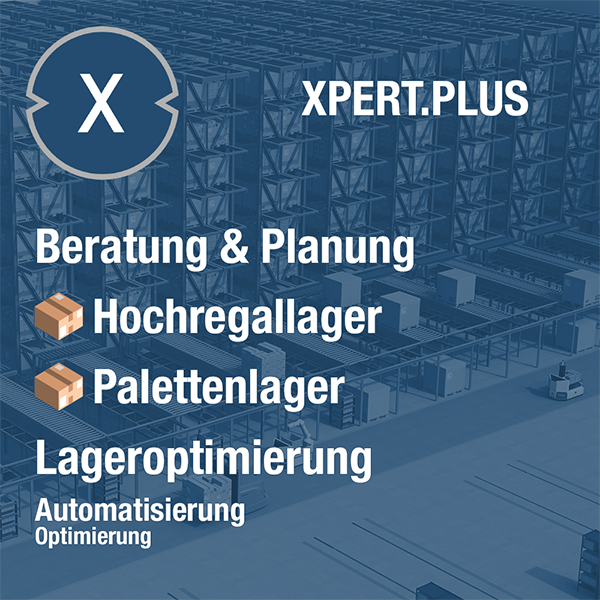
Xpert.Plus warehouse optimization - high-bay warehouses such as pallet warehouses consulting and planning
We are there for you - advice - planning - implementation - project management
☑️ Smart City & Factory: Industry expert for energetic 5G buildings and halls as well as advice and installation of solar systems
☑️ Xpert.Plus - logistics consulting and logistics optimization
☑️ Industry expert, here with his own Xpert.Digital Industry Hub with over 2,500 specialist articles
I would be happy to serve as your personal advisor.
You can contact me by filling out the contact form below or simply call me on +49 89 89 674 804 (Munich) .
I'm looking forward to our joint project.
Xpert.Digital - Konrad Wolfenstein
Xpert.Digital is a hub for industry with a focus on digitalization, mechanical engineering, logistics/intralogistics and photovoltaics.
With our 360° business development solution, we support well-known companies from new business to after sales.
Market intelligence, smarketing, marketing automation, content development, PR, mail campaigns, personalized social media and lead nurturing are part of our digital tools.
You can find out more at: www.xpert.digital - www.xpert.solar - www.xpert.plus



